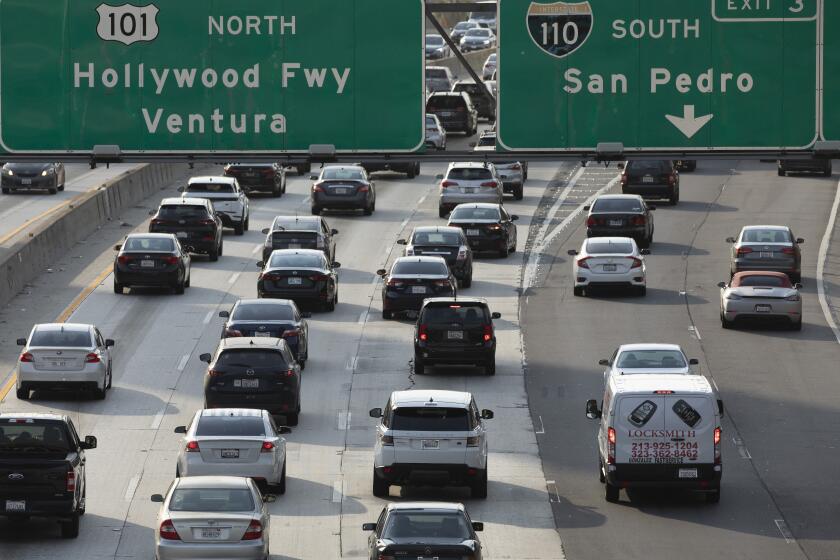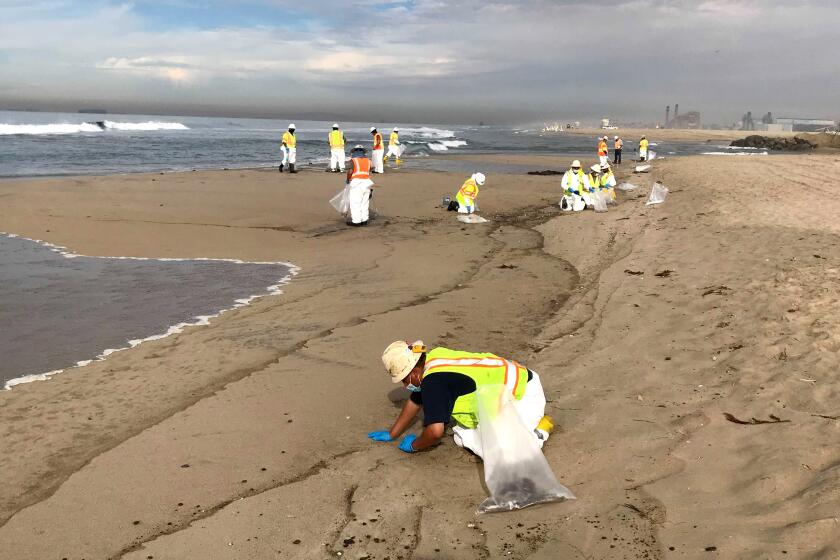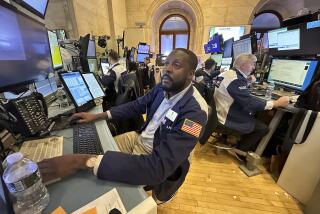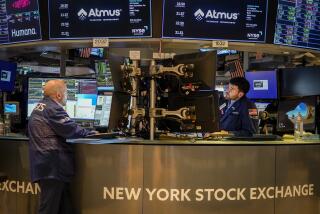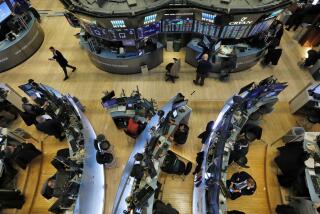Stocks edge higher as Wall Street shakes off volatility

Stocks recovered from an early slide on Wall Street to close with modest gains Wednesday as investors held out hope that Congress may yet be able to temporarily extend the federal government’s debt ceiling and buy lawmakers time to reach a more permanent resolution.
The market rallied back from a morning loss shortly after Senate Minority Leader Mitch McConnell (R-Ky.) offered Democrats an emergency short-term extension of the federal debt ceiling into December.
Financial markets have mostly taken the debt-ceiling drama in stride, expecting yet another 11th-hour solution, but some voices on Wall Street have warned investors recently to make preparations for a default, even if it is unlikely, given how extremely damaging it would be to the economy and markets.
“People were nervous about the debt ceiling,” said Jay Hatfield, chief executive of Infrastructure Capital Advisors.
California’s insurance commissioner says Allstate, Mercury and CSAA continue to shortchange policyholders on pandemic refunds.
The Standard & Poor’s 500 index rose 17.83 points, or 0.4%, to 4,363.55. The benchmark index had been down 1.3% earlier. Gains in technology companies, makers of household goods and communication companies helped offset losses in energy and other sectors. About 57% of stocks in the index rose. The S&P 500 had risen or fallen more than 1% on each of the last four days.
The Dow Jones industrial average rose 102.32 points, or 0.3%, to 34,416.99. The blue-chip index had been down more than 450 points in the early going. The Nasdaq composite gained 68.08 points, or 0.5%, to close at 14,501.91. The tech-heavy index had been down 1.2% before the afternoon rally.
Small-company stocks, a gauge of confidence in economic growth, fell: The Russell 2000 index gave up 13.36 points, or 0.6%, to close at 2,215.
If the nation’s debt ceiling, which caps the amount of money the federal government can borrow, isn’t raised by Oct. 18, the country “would likely face a financial crisis and economic recession,” Treasury Secretary Janet L. Yellen told Congress last week.
During a meeting Wednesday with bank executives, President Biden stressed the importance of Congress raising the debt limit.
“We haven’t failed to do that since our inception as a country. We need to act. These leaders know the need to act.”
A major oil spill off the coast of Huntington Beach, Calif., washed up on nearby Orange County beaches, killing fish and birds and threatening local wetlands.
The Senate went into recess late Wednesday so lawmakers could discuss McConnell’s proposal, delaying a procedural vote on a House-passed bill to suspend the debt cap.
The latest bout of market volatility comes as investors question the economy’s path forward, amid rising inflation and the ongoing COVID-19 pandemic. Bond yields have remained relatively stable since a sharp jump late last month that signaled concern that high inflation could linger longer than economists and investors had initially anticipated.
The yield on the 10-year Treasury held steady at 1.53%. It was as low as 1.32% a little more than two weeks ago.
Energy prices retreated from a recent rally that contributed to inflation fears. U.S. crude oil fell 1.9% and natural gas plunged 10.1%. The drop weighed on energy companies. Exxon Mobil fell 1.8%.
International markets also sold off, with exchanges in Japan, South Korea, Germany and France all dropping more than 1%.
Investors are grappling with a long list of uncertainties, and that could mean a more durable pullback in stocks than Wall Street has experienced this year, said Sameer Samana, senior global market strategist at Wells Fargo Investment Institute.
High on Wall Street’s list of concerns is the Federal Reserve’s timetable for raising interest rates. The Fed’s policymaking committee recently signaled the central bank could start raising rates late next year. Analysts have said that the Fed could act sooner than expected if high inflation persists.
“The investment case for those looking for further gains, at least this year, was the expectation that rates would stay at fairly low levels,” Samana said.
Investors will get a closer look at how companies fared in the third quarter when quarterly financial results are released over the coming weeks. Wall Street is expecting solid profit growth of 27% for S&P 500 companies, but will also be listening for commentary on how supply chain problems and higher costs are crimping operations.
Companies from a wide range of industries have issued warnings about supply chain problems, shipping delays and higher materials costs. Home builder Hovnanian slumped 13.6% after warning investors that supply shortages will hurt its finances.
Many items destined for retailer shelves this holiday season are hopelessly snarled in the global supply chain. What does that mean for shoppers?
Some companies are growing more concerned that the problem could stretch into the holiday shopping season that typically starts in late November. Toy companies are racing to get their products to retailers as they grapple with a severe supply chain crunch that could mean sparse shelves for the crucial holidays.
On Friday, the Labor Department will release its employment report for September. The labor market has been slow to fully recover from the pandemic, and the summer surge in COVID-19 cases further impeded its progress.
More to Read
Inside the business of entertainment
The Wide Shot brings you news, analysis and insights on everything from streaming wars to production — and what it all means for the future.
You may occasionally receive promotional content from the Los Angeles Times.
